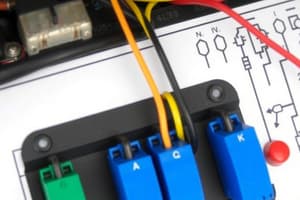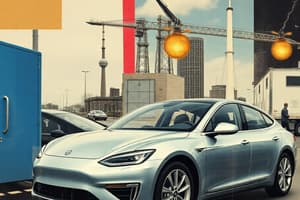Podcast
Questions and Answers
Which of the following represents the new DNA of the automotive industry? (Select all that apply)
Which of the following represents the new DNA of the automotive industry? (Select all that apply)
- Internal Combustion Engine
- Vehicle as a Product
- Transportation as a Service (correct)
- Rotating Electrical Machines (correct)
The four major focus areas of the automotive industry do not include connected vehicles.
The four major focus areas of the automotive industry do not include connected vehicles.
False (B)
What does ACES stand for in the context of the automotive industry?
What does ACES stand for in the context of the automotive industry?
Autonomous, Connected, Electric, Shared
The autonomous driving technology includes _____ vehicles.
The autonomous driving technology includes _____ vehicles.
Which of the following applications are included in shared mobility? (Select all that apply)
Which of the following applications are included in shared mobility? (Select all that apply)
What is the primary focus of the electric vehicles sector?
What is the primary focus of the electric vehicles sector?
Study Notes
Electrification of Automotive Powertrains
- Significant evolution in automotive design, shifting away from nearly 100 years of reliance on internal combustion engines.
- Transition from oil-based energy to diverse energy sources, enhancing sustainability.
- Vehicles are evolving from products to services, such as transportation as a service (TaaS).
- Focus is shifting toward tailored vehicles for specific uses rather than general-purpose models.
- Design philosophy is changing from driver-centric to user-centric, accommodating both riders and goods.
- Cost optimization has moved from vehicle price to cost per mile, emphasizing efficiency.
- Emphasizes the transition from human-operated to autonomous vehicle operations.
Major Focus Areas (ACES) of the Automotive Industry
- ACES consists of four interrelated sectors:
- Connected Vehicles
- Electric Vehicles
- Autonomous Driving
- Shared Mobility
Autonomous Driving
- Emergence of occupant-less, low-speed vehicles exemplifying new use cases in transportation.
- Conditional and fully automated driving systems are being integrated into passenger vehicles.
- Automated trucking operations enable efficiency in freight transport.
- Development of low-speed passenger shuttles enhances shared transportation options.
Connected Vehicles
- Connected vehicles form an essential part of the ACES framework, facilitating communication between vehicles and infrastructure.
- Integration with electric vehicles creates a comprehensive platform for modern transport solutions.
Electric Vehicles
- Electric vehicles (EVs) are supported by a robust ecosystem including auto original equipment manufacturers (OEMs) and component suppliers.
- Collaboration with fleet operators enhances the reach and efficiency of electric vehicle deployment.
- Importance of grid integration and charging infrastructure to support growing EV numbers.
Shared Mobility
- Shared mobility incorporates features like real-time, dynamic information and carpooling applications.
- Integration of multimodal trip planners provides users with seamless transit options.
- Real-time public and private transport options enhance user accessibility and convenience.
Studying That Suits You
Use AI to generate personalized quizzes and flashcards to suit your learning preferences.
Related Documents
Description
Explore the transition from traditional internal combustion engines to electric powertrains in the automotive industry. This quiz covers the evolution of energy sources and the implications of electrification on future automotive technologies. Test your knowledge on the fundamental changes taking place in the automotive landscape.




